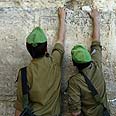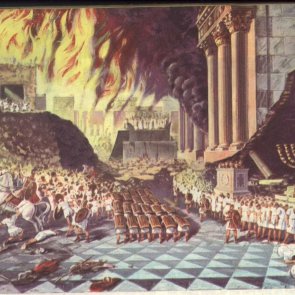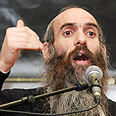
Over the weekend, I read an article in
Mekor Rishon about the kotel. (they have a funny web system, so I can't link to the piece.) The author lamented the fact that over the past few years he had grown increasingly distant from the Kotel. In past years, before any wedding the chatan and kallah would have pictures taken in front of the Kotel. You see less and less of that nowadays. We recently went to the Kotel for the Bar Mitzvah of the son of friends. Instead of davening at the kotel, I intentionally davened early at shul in Yad Binyamin to avoid having to daven at the Kotel. I did this so that I wouldn't feel pressured to make it to the Bar Mitzvah on time primarily. But there was also a part of me that doesn't really like davening at the Kotel. It's too much of a production. People are always bugging you for money. It's such a scene. And some part of me recoils at a sort of Kotel worship that I sense in so many Americans. The Kotel makes me sad, as I think it should. Instead of running to the kotel, sometimes I avoid it. I'm not entirely sure, but I feel that this might be a healthy feeling.
I wasn't alive for the capture of the Kotel during the Six-day war. I never felt that personal powerful sense of euphoria that's so evident when watching the old black and white video of the capture of the Kotel and Rav Goren blowing the shofar. But it's clear that the Kotel became a sign not of mourning, but of redemption. It became the symbol not of destruction and loss, but of redemption and rebirth.
I've never had that feeling. Every time I visit the Kotel, especially when I approach the site from the Jewish Quarter where I have to descend from the city to the Har Habayit, I feel a powerful sense of loss. How can you not, knowing that the Kotel was simply the outer retaining wall of the larger Beit Hamikdash structure. I find it at times difficult even to pray there, knowing how close - but how far we really are from where we should be. And I often feel that our celebration of the Kotel - our willingness to accept the Kotel as "good enough" - gives us a sense that we don't really need the Beit Hamikdash. After all, we have the Kotel. Do we really need more than that?
We do. The fact that we settle for the site "down below" while the Arabs occupy the holiest location in Judaism in the world should and must be a cause for mourning. I find it difficult to celebrate anything at the Kotel - because that celebration seems to fly in the face of God's House, lying in ruins, occupied by strangers.
And that, by itself, should give us pause on Tisha B'av.
 While many like to complain about the secular nature of the State of Israel, I often comment that secular Israelis are not as anti-religious as they seem. Many lay Tefillin, celebrate Shabbat with family members, fast on Tisha B'av and Yom Kippur, observe some level of kashrut, and care very much about Jewish ritual life. I saw a recent survey that seemed to agree with my sentiments.
While many like to complain about the secular nature of the State of Israel, I often comment that secular Israelis are not as anti-religious as they seem. Many lay Tefillin, celebrate Shabbat with family members, fast on Tisha B'av and Yom Kippur, observe some level of kashrut, and care very much about Jewish ritual life. I saw a recent survey that seemed to agree with my sentiments.
















